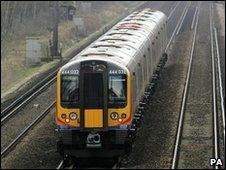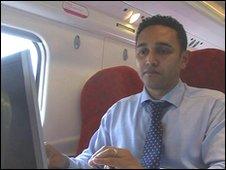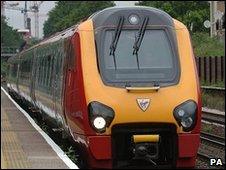Train operators accused of 'astronomical' fare rises
- Published

South West Trains says only 8% of its services have been redesignated
Some of the UK's biggest train operators are being accused of "astronomical" fare rises, as a result of extending peak-time hours.
The rail watchdog Passenger Focus says that some fares have nearly quadrupled since last year.
Train companies say that the number of people affected by such rises is "tiny".
Since January, over 180 trains a week have been rescheduled as "peak-time", a BBC survey found.
By redesignating trains as "peak", this allows train companies to increase fares without needing permission from the regulator.
Edward Welsh, of the Association of Train Operating Companies (Atoc), says the vast majority of travellers have seen fares fall, stay the same or rise below the rate of inflation.
"The average increase in fares this January was 1.1%. That's the lowest since privatisation 15 years ago," he says.
One train affected by the rises is the 0950 Virgin Trains service from Birmingham to London.
Last year this train was off peak. But after Virgin decided to extend ticket restrictions for more than an hour a day, it is now peak.

Commuter Antony Ray has seen his ticket price more than triple
On board, we found businessman Antony Ray, who has no choice but to use this particular service.
As a result of the changes, his fare from Telford to London has more than tripled from £45 to £158 for a return journey.
"It's crazy," he says. "You basically can't get down to London and get back in time for meetings. The car's much cheaper."
Last year, taking the 0915 from London Euston to Manchester, returning at 0855 the next day, would have cost £66.
Now that Virgin has extended its peak hours, the same ticket costs £262.
Anthony Smith, of Passenger Focus, says such rises are astronomical.
"Tinkering with ticket restrictions causes confusion. And if your journey has gone up by four times, you're going to feel you've been done," he says.
The changes
Our survey found that South West Trains, which runs commuter routes out of London Waterloo, has redesignated 114 trains, including all services between 1600 and 1900.
However, the company points out that even though super off-peak tickets are no longer valid on these services, off-peak tickets are still accepted.

Virgin says passengers can save money by buying in advance
Virgin has redesignated 75 trains a week as peak, as a result of extending peak hours by 35 minutes in the morning, and 28 minutes in the afternoon.
To get an off-peak service into London, passengers need to arrive in the capital after 1130.
The first Virgin off-peak service from Rugby is listed for 1124, meaning you would not arrive in London until after midday.
However, on the East Coast mainline, which was taken over by the government last year, five trains a week have been reassigned the other way, from peak to off-peak.
Online savings
Both Virgin and South West Trains point out that the number of people affected by such rises is relatively small.
Virgin told the BBC that 3.4% of their services have been redesignated. The figure for South West Trains is 8%.
Virgin also pointed out that passengers can make considerable savings by buying their tickets in advance, and online.
An Atoc spokesman said: "Picking out fares that will only be paid by a very small proportion of customers, gives an incredibly partial impression of ticket prices.
"This year, thanks to the lowest fare rises since privatisation, the vast majority of people have seen fares fall, stay the same or rise below the rate of inflation."
Atoc also adds the train fares affected by peak-time hours being extended is a very small minority - under one per cent - of millions of journeys made daily on the railway network.
The changes in peak services are complex for passengers to understand. It is all too easy to get on a train with the wrong ticket, or to pay more than necessary.
So can they expect to get clear advice from railway staff?
Not according to the consumer magazine, Which?
In a survey last year, Which? found that one in three station staff gave out incorrect advice, and nearly half of National Rail Enquiries staff passed on the wrong information.
"That leads to customer confusion," says Matt Bath from the magazine. "Customers can hold the wrong tickets and potentially travel at the wrong time."
But Atoc disputes the findings of the Which? survey. It claims that independent research has found that 99% of the advice being given out is accurate.
Passenger Focus says the truth lies somewhere in the middle.
Changing the rules?
Train operators are doing nothing wrong by redesignating trains as peak-time services.
And it does have one major advantage for them.
At the moment only off-peak fares are controlled by the regulator. So lengthening peak hours gives operators much more freedom to increase prices at will.
But given some rather more urgent priorities for the new UK government, there is unlikely to be immediate pressure to change the current rules - even though extending peak times means the operators will find it hard to duck the accusation that it is a very easy way to put up fares.